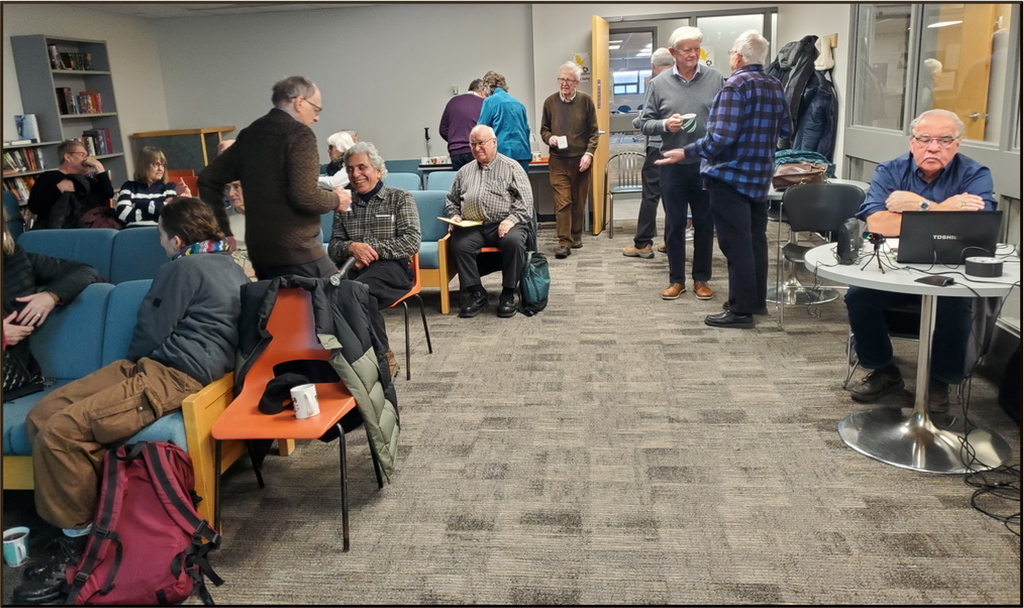Upcoming Change to Email Service for WLU Retirees
by Gerry Schaus
At the November meeting of the WLU Retirees’ Association, the largest gathering of our members in recent memory was presented with information about a major change coming to the Laurier email service for retirees. This development has important ramifications for all those who have retained their WLU email addresses and who continue to rely on Laurier for this service, yet the Association was not consulted about the changes as they were being developed. The implications of this development for our members certainly brought out a large crowd of about 60 people, half in person and half on the ZOOM link. Questions and concerns were voiced for more than 90 minutes, as our two guests from WLU’s Information Technology area, Nela Petkovic, Chief Information Officer, and Yi Ruan, Manager of Security and Identity Management, received more than a little feedback from the audience.

WLURA members gathering for coffee and cookies before a recent Friday afternoon presentation.
After providing some background about the upcoming changes, especially highlighting problems with security of information and volume of attacks on individuals and the system generally, Nela and Yi gave a summary of the effects that proposed changes will have specifically on WLU retirees. The volume of emails coming through the WLU system every day, we were told, was 700 billion! Hard to believe! Trying to keep Laurier’s personal and institutional information safe is a huge problem, and it is only becoming worse. The Educational sector, apparently, is the subject of the most cyber attacks of any sector in today’s society. So, to protect the University from such relentless and hostile threats, beginning in January, 2024, all WLU retirees will have their email addresses changed, unless they can successfully argue to their respective deans, that they continue to have a valid working relationship at/with the University. This is specifically to meet licensing requirements by the University software providers (Microsoft Outlook). The implementation timeline is somewhat fluid, apparently, but it will be carried out as quickly as possible. The IT department will do its best to make the transition as easy for retirees as possible, we were assured. Skepticism, however, was clearly apparent.
The audience was shown in a series of illustrations what steps
would be taken to implement the changes. The plan is to move
all retirees who wish to continue to use WLU’s
email service to a new and separate domain, so that their new
email addresses would have the user’s full first
and last names separated by a dot (.), then after the @ sign,
to have the suffix “ret” followed by “wlu”
and “ca” separated by dots,
so, for example:
Among the concerns raised by the audience, both online and in person, was the implementation timeline since it was clear that 60 days or less for retirees to go through all their old emails and make decisions about which ones would be moved to the new domain was not going to be enough time. Our speakers were told that six months or a full year for implementation ought to be considered. Meantime, as new email addresses were being set up, the problem of how long newly arriving emails using the old addresses would be forwarded to the new email addresses was also worrying. Several in the audience thought that this forwarding service should continue for at least a year, and probably longer.
Another issue was one brought up a year and a half ago (April 28, 2022) when Nela and Yi also addressed our group, and that was access to our email archives. Some may remember that retirees were suddenly and unexpectedly cut off from access to the archive of all our old emails. This was again brought up at the November meeting. The problem of accessing the archive, unfortunately, was not well addressed and remained open, although it seemed that individuals will have to go through the process of gaining access on a case-by-case basis.
Another question concerning this transition was how one could access WLU emails using the multi-factor authentication, either through a text message or other means. We were told that if we have a landline phone or if we are overseas without a cell phone and could not receive a six-digit code to verify our identity, we would be able to get a device called a “dongle” and carry that around to generate a six-digit verification number for us.
One matter of some concern to the audience was having an email address that would identify us as retirees (“@ret.wlu.ca”) and therefore more easily vulnerable to online predators through phishing or malware or other means. We were told that the Privacy Office had vetted the proposal, and that’s why the suffix “ret,” not, for example, “retiree” was used. This provoked the response that “ret” is easily figured out as an abbreviation for “retiree.” How the Privacy Officer approved this was a question in people’s minds.

Tail (IT) wagging the dog (WLU Retirees)
In January, both online and in-person seminar sessions have been offered to anyone interested in changing their emails to this new system. Meantime, the WLURA Executive has met and plans to make a presentation to the WLU Board of Governors about concerns regarding these changes and how they were handled, along with a list of other matters on the minds of WLU retirees. (See WLU Email Changes for more information.)